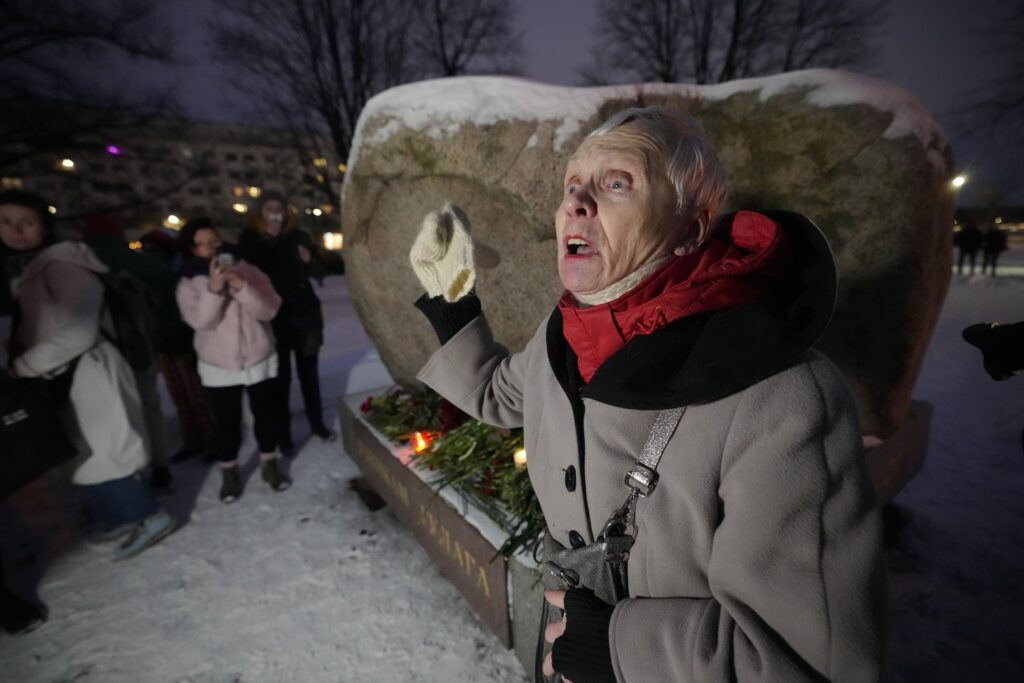Russia’s announcement that Alexei Navalny, an archcritic of Russian President Vladimir Putin, has died in prison unleashed a chorus of grief and anxiety about the fate of other pro-democracy activists.
“Basically, they enter a new stage of repression,” expatriate Russian economist Konstantin Sonin told the Washington Examiner. “They’re now not trying to pretend that Putin is popular or something. He is in power because he kills people.”
Navalny’s death was announced on Friday, two months after his sudden transfer to a remote Siberian prison known as the “Polar Wolf.” His demise, widely perceived as a murder by Putin and his associates — Russian authorities claim that this allegation is premature — sparked an outpouring of support for Navalny from Russian citizens at home and abroad despite the intense restrictions on dissent in the country.
“People are talking quietly. They bear red-and-white flowers. Many are crying quietly, hugging,” a woman identified as Ksenia told the Moscow Times. “I expected police, but here there are only people who have lost a lot today.”

In Moscow, Navalny’s mourners chose as their point of assembly “a memorial to Gulag victims outside the FSB headquarters,” according to the Financial Times’s Max Seddon. In parallel, Belarusian opposition leader Sviatlana Tsikhanouskaya met with Navalny’s widow, Yulia, on the sidelines of the Munich Security Conference.
“I have no doubt that Alexei Navalny was purposefully killed by the Putin regime,” Tsikhanouskaya posted on social media. “In Belarus right now, dozens of political prisoners are held incommunicado by a regime that is allied with Putin. I call on the global community to take decisive action to save their lives.”
Navalny’s death was announced almost exactly one month before Russian voters are scheduled to reelect Putin — a prospect that, according to some observers, might account for Navalny’s death.
“‘Elections’ even if they are not real are the moment when [the] usual Russian thinks about politics,” a senior European official told the Washington Examiner. “So this is a fragile moment for [a] dictator. Brutal dictators are actually scared persons. Navalny was able to communicate even if he was jailed beyond polar circle.”
Navalny issued a sharp condemnation of Putin and his associates last month on the third anniversary of his imprisonment.
“I don’t like being in prison. But I won’t renounce my convictions or my homeland,” he said in a Jan. 17 statement. “[This system] will collapse and crumble. Putin’s state isn’t viable. One day, we’ll look at his place, and he won’t be there. Victory is inevitable. But for now, we must not give up and we must stick to our convictions.”
Yet some Western analysts question whether Russian authorities ordered Navalny’s killing directly, or if he succumbed to generally inhumane treatment.
“No question that Navalny’s death is a heinous crime and that Putin is responsible. That said, I think it’s unlikely that Putin decided to kill Navalny now,” the Quincy Institute’s George Beebe, a former senior CIA analyst, said. “Rather, it’s likely that years of ill health, created by numerous poisonings carried out by Russian intelligence, combined with onerous conditions in Russian penal camps, finally led to Navalny’s demise.”
CLICK HERE TO READ MORE FROM THE WASHINGTON EXAMINER
Navalny’s family and friends learned in December that he had been transferred to an Arctic prison. “Before that, his whereabouts were unknown to the public and to his family for 19 days,” as Meduza, an independent media outlet, noted. Another prominent dissident, Vladimir Kara-Murza, was transferred last month to a different prison in Siberia unexpectedly, to the alarm of his family.
“There is no opposition figure who could immediately fill the void” left by Navalny, Sonin wrote on Friday. “For Putin, this is a new stage in his rule. Killing a popular opponent in the open has its major cost. The main cost is ‘rising stakes.’ Now, when Putin’s gone, the new leadership will see Putin’s entourage as a gang of criminals and will deal with them accordingly.”

